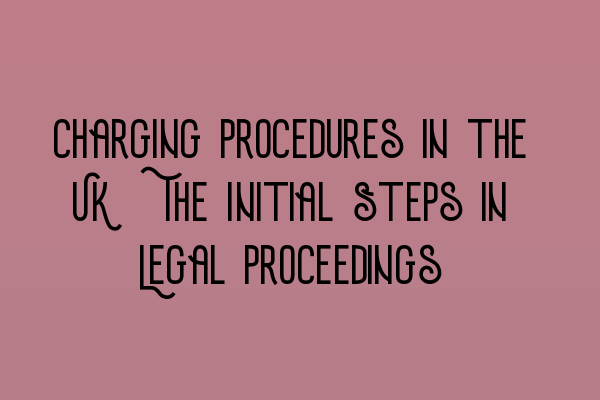Charging Procedures in the UK: The Initial Steps in Legal Proceedings
Welcome to the SQE Criminal Law & Practice Law UK blog! In today’s post, we will be discussing the initial steps in legal proceedings, specifically focusing on charging procedures in the UK. Understanding the charging process is crucial for legal practitioners and anyone interested in criminal law. Let’s dive in!
What are Charging Procedures?
Charging procedures refer to the formal process of bringing criminal charges against an individual in the UK. These procedures are necessary to ensure that individuals are aware of the charges they face and have the opportunity to defend themselves. It is an essential step in the legal proceedings that serve to protect the rights of the accused.
Before the charging process begins, the police investigate the alleged offense. Once they have gathered sufficient evidence, they submit their findings to the Crown Prosecution Service (CPS). The CPS, then, decides whether there is enough evidence to proceed with the prosecution. If the CPS believes there is a reasonable chance of conviction, they will authorize the police to charge the suspect.
The Charging Decision
The charging decision is a critical step in the process, as it determines whether an individual will face criminal proceedings or not. The CPS considers various factors before making a charging decision, including the strength of the evidence and the public interest. They evaluate if there is a realistic prospect of conviction and if it is in the public interest to prosecute.
It’s important to note that the charging decision can have significant consequences for both the accused and the victims involved. Therefore, the CPS holds the responsibility to exercise due diligence and make an informed decision, ensuring a fair trial for all parties.
The Initial Court Appearance
Once charges have been authorized, the accused will be brought before a magistrate or a judge in the initial court appearance. During this appearance, the charges against the accused will be read out, and the defendant’s plea will be recorded. The accused will have the opportunity to seek legal representation, and if they cannot afford legal representation, they may be eligible for legal aid.
The initial court appearance is a crucial stage in legal proceedings, as it sets the tone for the future course of action. It is essential for the accused to understand their rights and the charges they are facing. Qualified legal professionals can provide the necessary guidance and support in navigating the legal process.
Conclusion
Understanding the charging procedures in the UK is vital for legal practitioners, aspiring lawyers, and anyone interested in criminal law. The initial steps, from the police investigation to the CPS charging decision and the initial court appearance, play a significant role in safeguarding the rights of the accused.
If you’re preparing for the SQE 1 or SQE 2 examinations, we recommend checking out our SQE 1 Practice Exam Questions and SQE 1 Practice Mocks FLK1 FLK2 articles for useful study resources. We also offer comprehensive SQE 2 Preparation Courses and SQE 1 Preparation Courses to help you succeed in your exams.
Stay tuned to our blog for more informative articles on criminal law, legal practice, and updates on SRA SQE Exam Dates. If you have any questions or need legal assistance, don’t hesitate to contact SQE Criminal Law & Practice Law UK. Our experienced solicitors are here to help.
